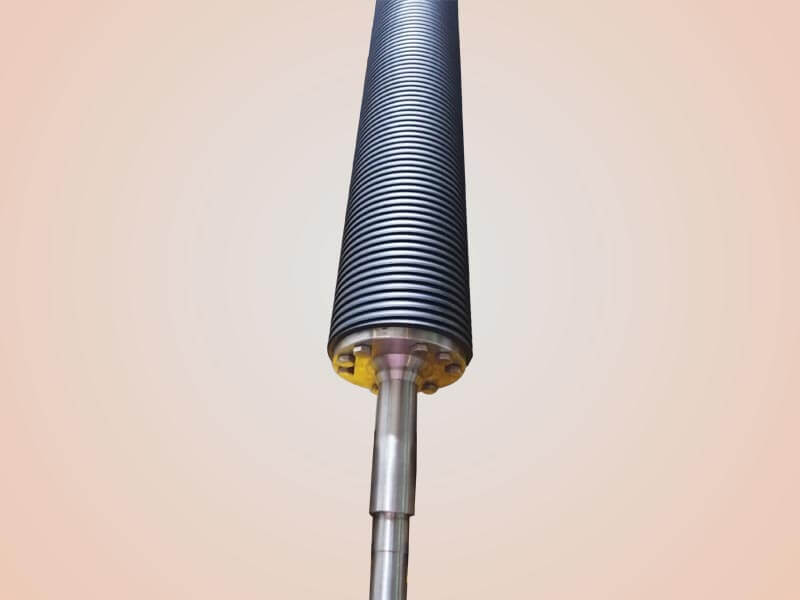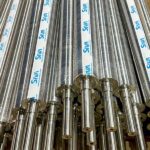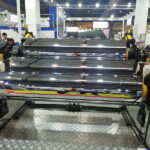How Ebonite Roller Help in Smooth Textile Production
In the textile industry, precision and consistency are essential at every stage of production. From fabric processing to finishing, one key component that quietly plays a critical role is the Ebonite Roller. Though often overlooked, these roller are vital to maintaining tension, ensuring smooth fabric movement, and improving the quality of the final product. Their hard and durable surface, resistance to chemical corrosion, and long service life make them the preferred industrial roller solution for textile machinery across the globe.
The Role of Ebonite Roller in Textile Machinery
Ebonite roller are widely used in textile machines like sizing machines, calendaring units, dyeing machines, and printing machines. Their main purpose is to handle fabric with care while maintaining accuracy and alignment throughout various processing stages. Since textile production involves constant motion and speed variation, ebonite rollers act as stabilizing tools. Their high load-bearing capacity and dimensional stability reduce fabric slippage and improve machine efficiency.
The smooth and hard surface of the ebonite roller prevents wrinkles and creases in the fabric, especially during high-speed operations. This becomes crucial in maintaining fabric quality and reducing wastage. Ebonite also offers better grip, especially when paired with other rollers, such as rubber coated rollers, within the same system. This dynamic balance ensures fabric is guided without deviation or damage.
Durability Under Harsh Operating Conditions
One of the standout features of an ebonite roller is its ability to withstand tough environments. Textile processing often involves exposure to water, steam, high temperatures, and chemicals. Ebonite, being a vulcanized rubber with high sulfur content, offers excellent chemical resistance. This makes the roller surface stable and non-reactive, even when exposed to harsh dyeing or bleaching agents.
In addition to chemical resistance, ebonite rollers are known for their rigidity and toughness. They resist deformation and wear, ensuring that they can operate continuously without affecting textile tension. Their long service life directly contributes to reduced downtime and maintenance costs in textile plants.
Precision and Consistency in Fabric Tensioning
Maintaining consistent fabric tension is crucial in textile processing, particularly in processes like dyeing, calendaring, and drying. Uneven tension can result in warped patterns, color irregularities, and stretched or torn fabric. This is where industrial roller made from ebonite play a key role. Their uniform diameter and balanced structure ensure even fabric feed and tension control.
Ebonite rollers are crafted to tight tolerances, which means they maintain roundness and surface stability even after prolonged use. This consistency supports continuous textile flow without sudden jerks or misalignment, resulting in smoother operation and higher-quality output.
Compatibility with High-Speed Operations
Textile production often runs at high speeds to meet volume demands. For rollers, this means they must maintain accuracy without causing friction-related damage. Ebonite roller are engineered to run silently and smoothly even under rapid rotations. Their dense material composition reduces vibrations, making them perfect for high-speed textile machines.
In addition, these roller offer minimal wear and generate less heat compared to other materials. This contributes to longer machine life and helps maintain the integrity of heat-sensitive fabrics. When used in synchronization with drive rollers and guide rollers, ebonite rollers add mechanical harmony to the system.
Chemical and Heat Resistance in Textile Finishing
Textile finishing processes, such as printing, dyeing, and calendaring, expose rollers to heat and chemicals. Ebonite’s unique properties make it ideal for such environments. It remains dimensionally stable even under exposure to temperatures around 70°C–80°C and contact with alkaline or acidic solutions commonly used in textile processing.
This makes the ebonite roller a critical part of the finishing process where the fabric must be treated delicately yet effectively. The hard, polished surface of ebonite ensures smooth fabric glide without absorbing moisture or chemical residues. This enhances the cleanliness and reliability of the process.
Low Maintenance and Cost-Effective Operation
Another benefit of using ebonite rollers in textile industries is their low maintenance requirement. Unlike metal rollers that may corrode or rubber rollers that may degrade quickly, ebonite offers longer lifespan and fewer operational interruptions. Once installed, these rollers need minimal lubrication and infrequent replacements, making them a cost-effective choice for textile plants aiming to reduce operational expenses.
Because of their non-reactive nature, they also help maintain cleaner processing lines, reducing the frequency of machine shutdowns for cleaning. This enhances production time and output efficiency, especially in high-demand settings like fabric mills and textile dye houses.
Suitable for Multiple Textile Applications
Ebonite rollers are used across multiple textile segments including cotton, polyester, silk, and blends. Whether the fabric is being pre-treated, dyed, dried, or finished, these rollers provide the right balance of grip and smoothness. They can be customized for various machine types, making them adaptable across older as well as modern textile machinery setups.
In addition, their compatibility with other rollers—such as PU-coated rollers or stainless-steel rollers—makes them a versatile component in a larger industrial roller system. This flexibility ensures they can be installed or retrofitted with ease, supporting continuous plant upgrades.
Ebonite Roller and Sustainable Production
In today’s textile world, sustainability is becoming a significant concern. Ebonite rollers support sustainable textile production by reducing fabric waste, lowering machine energy consumption due to smoother operations, and reducing the need for frequent roller replacements. Their extended life cycle and reliable performance make them an environmentally conscious investment for modern textile manufacturers.
Additionally, by improving product quality and minimizing fabric defects, they help reduce the need for reprocessing or discarding fabric—both of which are crucial in reducing overall environmental impact.
Trusted Manufacturer for Quality Ebonite Roller
For textile manufacturers seeking reliable and long-lasting ebonite rollers, Siva Rollers stands out as a leading choice. Based in Ahmedabad, India, Siva Rollers is known as the best ebonite roller manufacturer in the region, serving top-tier textile clients with high-precision, industrial-grade rollers. Their rollers are manufactured with attention to material quality, dimensional accuracy, and performance consistency, making them a trusted name in textile roller solutions.
Their expertise in the industrial roller segment ensures that each ebonite roller is tailored to the specific needs of textile plants, supporting high-volume production and reducing machinery stress. With a focus on customer satisfaction and long-term performance, Siva Rollers continues to be the preferred partner for the textile industry.
Final Thoughts
Ebonite rollers are an essential part of modern textile production, offering benefits like durability, chemical resistance, precision, and cost efficiency. Their role in maintaining fabric tension, supporting high-speed operations, and withstanding challenging conditions makes them indispensable in the textile processing chain. Whether it’s dyeing, finishing, or calendaring, the use of industrial rollers made from ebonite leads to improved efficiency and superior fabric quality.
With the support of expert manufacturers like Siva Rollers, textile businesses can ensure that their operations remain smooth, reliable, and future-ready.
FAQs
Ebonite rollers are used to maintain fabric tension, guide fabric through machines, and support high-speed, chemical-resistant operations in textile processing.
Ebonite offers durability, chemical resistance, and dimensional stability, making it ideal for harsh textile environments where other materials may fail.
Yes, their chemical and heat resistance makes them highly suitable for dyeing, printing, and finishing processes in textile manufacturing.
Their long life, low maintenance, and ability to reduce fabric waste contribute to sustainable production practices in the textile industry.
Siva Rollers, based in Ahmedabad, is widely recognized as a trusted and high-quality ebonite roller manufacturer serving the textile sector.



